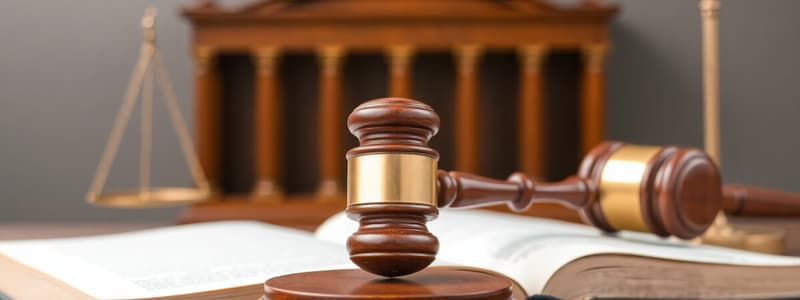Podcast
Questions and Answers
Which of the following best describes the focus of the Administrative Law module?
Which of the following best describes the focus of the Administrative Law module?
- Analysis of international treaties and their implications for national law.
- The intersection of individual rights, government powers, and legal processes. (correct)
- The historical development of common law traditions in England.
- Comparative study of different constitutional frameworks across European nations.
In the context of Administrative Law, what is the primary purpose of judicial review?
In the context of Administrative Law, what is the primary purpose of judicial review?
- To allow courts to assess the merits of policy decisions made by administrative bodies.
- To ensure the compatibility of all laws with international human rights standards.
- To oversee the legality and fairness of decisions made by public bodies. (correct)
- To provide advisory opinions to the executive branch on legislative matters.
How does the concept of parliamentary sovereignty relate to the power of the courts in the UK?
How does the concept of parliamentary sovereignty relate to the power of the courts in the UK?
- The courts have absolute power to strike down any Act of Parliament that conflicts with fundamental rights.
- The courts can only review Acts of Parliament if requested to do so by a majority vote in the House of Commons.
- Parliament's legislative authority is supreme, and courts cannot generally overrule or set aside Acts of Parliament. (correct)
- The courts and Parliament share equal power in creating and interpreting laws.
Which statement accurately reflects a key aspect of the separation of powers doctrine?
Which statement accurately reflects a key aspect of the separation of powers doctrine?
What is the significance of the 'rule of law' in a constitutional democracy?
What is the significance of the 'rule of law' in a constitutional democracy?
How does the Human Rights Act 1998 interface with the principle of parliamentary sovereignty?
How does the Human Rights Act 1998 interface with the principle of parliamentary sovereignty?
In the UK constitutional context, what does it mean to say that Parliament cannot bind its successors?
In the UK constitutional context, what does it mean to say that Parliament cannot bind its successors?
According to A.V. Dicey, what is the essence of parliamentary sovereignty?
According to A.V. Dicey, what is the essence of parliamentary sovereignty?
What is the principle established in Entick v Carrington regarding the limits of executive power?
What is the principle established in Entick v Carrington regarding the limits of executive power?
What was the central issue in M v Home Office and its significance for the rule of law?
What was the central issue in M v Home Office and its significance for the rule of law?
In which context might the principle of parliamentary sovereignty be seen as challenged or constrained?
In which context might the principle of parliamentary sovereignty be seen as challenged or constrained?
Which of the following best describes the role of the judiciary in relation to administrative actions?
Which of the following best describes the role of the judiciary in relation to administrative actions?
What is a key implication of the principle that Parliament can legislate for any place?
What is a key implication of the principle that Parliament can legislate for any place?
How does the rule of law protect against arbitrary government action?
How does the rule of law protect against arbitrary government action?
In what way does the concept of 'separation of powers' contribute to the protection of individual liberties?
In what way does the concept of 'separation of powers' contribute to the protection of individual liberties?
What is the significance of Madzimbamuto v Lardner-Burke in the context of parliamentary sovereignty?
What is the significance of Madzimbamuto v Lardner-Burke in the context of parliamentary sovereignty?
According to Scrutton LJ in Ellen St Estates v Minister of Health, how can Parliament effectively alter an existing Act?
According to Scrutton LJ in Ellen St Estates v Minister of Health, how can Parliament effectively alter an existing Act?
What is the role of formative assessment in the Administrative Law module?
What is the role of formative assessment in the Administrative Law module?
Which of the following actions is most likely to be protected under the Human Rights Act 1998?
Which of the following actions is most likely to be protected under the Human Rights Act 1998?
In the context of administrative law, what does 'ultra vires' generally refer to?
In the context of administrative law, what does 'ultra vires' generally refer to?
What is the primary distinction between public law and private law?
What is the primary distinction between public law and private law?
How did the War Damage Act 1965 relate to the Burmah Oil case and the principle of retrospective legislation?
How did the War Damage Act 1965 relate to the Burmah Oil case and the principle of retrospective legislation?
What is the core idea behind the rule of law, as quoted by H. Barnett?
What is the core idea behind the rule of law, as quoted by H. Barnett?
Which of the following is an example of 'separation of powers' in practice?
Which of the following is an example of 'separation of powers' in practice?
According to Lord Campbell, what can a court of justice examine in relation to Acts of Parliament?
According to Lord Campbell, what can a court of justice examine in relation to Acts of Parliament?
Flashcards
Parliamentary Sovereignty
Parliamentary Sovereignty
The ability of Parliament to enact any law whatsoever.
Judicial deference
Judicial deference
The principle that no court can overrule an Act of Parliament.
Unbound Parliament
Unbound Parliament
Parliament's inability to bind itself, allowing future Parliaments to change laws.
Global Reach
Global Reach
Signup and view all the flashcards
Separation of Powers
Separation of Powers
Signup and view all the flashcards
The Rule of Law
The Rule of Law
Signup and view all the flashcards
Government of Laws
Government of Laws
Signup and view all the flashcards
Property Rights
Property Rights
Signup and view all the flashcards
Ministerial obedience
Ministerial obedience
Signup and view all the flashcards
Study Notes
LAWS51942 Administrative Law - Introduction
- The instructor is Dr. Elodie Van der Berg, and she can be reached at [email protected].
Recommended Text
- Neil Parpworth's "Constitutional and Administrative Law," 12th edition (Oxford University Press, 2022), is recommended.
Assessments
- The module assessment consists of a 3,000-word essay covering all aspects.
- Attendance is a factor.
- There will be a formative assessment.
Topics
- Judicial Review
- Human Rights, specifically the European Convention on Human Rights and the Human Rights Act 1998
Relevant Topics from Constitutional Law Module
- Parliamentary sovereignty.
- Separation of powers.
- The rule of law.
- Public law vs. private law
Constitutional Law: Parliamentary Sovereignty
- Parliament can enact any law.
- No court or body can overrule or strike down an Act of Parliament.
- Parliament cannot bind itself.
- Parliament can legislate for any place.
- Parliament can legislate retrospectively.
- AV Dicey stated that parliamentary sovereignty means Parliament has the right to make or unmake any law, and no person or body can override or set aside Parliament's legislation.
- Madzimbamuto v Lardner-Burke [1969] clarified that even if doing certain things would be unconstitutional in a moral or political sense, courts will not invalidate an Act of Parliament if Parliament chooses to do them.
- In Edinburgh and Dalkeith Railway Co v Wauchope (1842), Lord Campbell affirmed that courts can only verify that a bill has passed both Houses and received Royal Assent, without inquiring into the process of its introduction or passage.
- Ellen St Estates v Minister of Health [1934] confirmed Parliament can alter or repeal a previously passed Act, even through an inconsistent provision.
- Sir Ivor Jennings stated Parliamentary supremacy means that Parliament can legislate for all persons and all places.
- Burmah Oil v Lord Advocate [1965] and the War Damage Act 1965 exemplify Parliament's power to legislate retrospectively.
Constitutional Law: Separation of Powers
- It is a fundamental aspect of constitutional order in liberal democracies.
- Governmental activity must be divided into legislative, executive, and judicial functions.
- Concentrating multiple forms of governmental power in one entity can lead to tyranny.
- The three different things the concept of separation can mean:
- The same people should not form part of more than one of the three organs of government.
- One organ of government should not control or interfere with the work of another.
- One organ of government should not exercise the functions of another.
Constitutional Law Module: Rule of Law
- Aristotle: “The rule of law is to be preferred to that of any individual.”
- Chief Justice Marshall in Marbury v Madison: "The government of the United States has been emphatically termed a government of laws, and not of men."
- Bradley & Ewing: "Law and order better than anarchy."
- Entick v Carrington (1765): Every invasion of private property, no matter how small, is a trespass under England's laws.
- M v Home Office [1994]: The executive obeying the law should be a necessity and not a matter of grace.
- H. Barnett: Every person is subject to the law regardless of their rank or status in society.
Studying That Suits You
Use AI to generate personalized quizzes and flashcards to suit your learning preferences.




